April 23, 2014
Dear waste pickers and allies,
We are happy to share with you the 9th edition of the Global Alliance of Waste Pickers newsletter, “Struggles and Victories: Waste Pickers on the Frontline.” In India, SWaCH waste pickers’ cooperative celebrated five years of door-to-door recycling services in Pune city. A new video from Bogota shows the continued struggle of the organized waste pickers for their already-won rights as the city’s service providers. On International Women’s Day, a powerful letter from women waste pickers calls for inclusive recycling and equality, and an article about the Gender and Waste project in Brazil brings to light the important work that women waste pickers are doing to bring about more equality in their lives and in the workplace. In March, more than 30 waste pickers came together in Argentina for the Latin American Waste Pickers’ Workshop, launched a declaration, and planned around the next International Labor Conference. And in April, the Biffins, or informal recyclers of Paris held a march to defend their livelihoods in the face of displacement.
In solidarity,
Deia, Lucia, Pablo
WIEGO Communications support team for GlobalRec.org
Table of contents
Asia
SWaCH Newsletter: Five Years and Counting (India – March 2014)
Through this latest 12-page issue of the newsletter, SWaCH Cooperative shares the journey it has been on since it was founded five years ago – the excitement, the anxieties, successes and new ideas that have emerged for making Pune a better city for all in the years to come. SWaCH also shares what some of Pune’s citizens and members have to say about SWaCH. This issue of the newsletter also shares important information about the PMC-SWaCH partnership – what worked, what didn’t and the way forward. Also, on March 16, SWaCH held an event “SWaCH Five Years and Counting” to release the latest newsletter and share with the public SWaCH’s work. Read the newsletter (pdf).
SWaCH Pune and Mumbai waste pickers on national television program (India – March 2014)
SWaCH Pune and Mumbai waste pickers were featured on a popular national TV show on contemporary social issues anchored by actor Amir Khan. The first segment of the show consists of 90 minutes on the subject of solid waste management. The second link consists of the waste picker segment. In a first for the show, 1,000 waste pickers and their children participated in a public viewing organized by KKPKP-SWaCH. Watch “Invisible Environmentalists” in English or in Hindi.
Real Women, Incredible Lives: From ragpicker to entrepreneur (India – February 2014)
NDTV 24X7, a national news channel, made a short documentary titled ‘’Real women, incredible lives: From ragpicker to entrepreneur” and Rekha, a waste picker associated with Chintan Environmental Research and Action Group and Safai Sena, was a part of it. After her husband’s death, Rekha moved from Bihar to Delhi in order to feed her baby. She began working as a waste picker. She remarried and saw her life transformed. She found out about Chintan and Safai Sena, a registered group of waste pickers. Now Rekha is a waste manager and leads a team of 12 women. She feels empowered and hopes to transform the lives of many people like her. Watch the video.
Waste pickers to stop subsidising the Pune Municipal Corporation! (India – January 2014)
Through an agreement, valid until September 2013, SWaCH has provided a low cost option to the Pune Municipal Corporation (PMC) and users for waste collection and waste reduction services. According to the agreement, PMC was to provide infrastructure, some administrative payments, supplement to cover collection from slums, welfare benefits for waste pickers. But the PMC has not fully held up its side of the agreement: on payment (SWaCH has not received full payment), PMC has not adhered to the schedule for the provision of safety gear and welfare benefits. PMC has not provided sufficient material recovery centres/sheds (where waste can be sorted). In addition PMC has allowed some wards to provide free collection services, even though the cost to the municipality will be greater than if SWaCH provided that service. SWaCH continues to provide services to users even though the agreement ended on September 30, 2013 and SWaCH has not received components of its fees since February 2013. SWaCH estimates that it is owed about 4.8 million rupees which is over $75,000 USD. PMC residents should support SWaCH and the waste model. The poorest workers should not be subsidizing the PMC’s solid waste management costs. Read the complete article.
Latin America
Waste and Gender: Rethinking Gender Relations for Empowerment (Brazil – March 2014)
Little research exists about gender relations and divisions among waste pickers. A collaborative project involving waste pickers in Latin America seeks to shed light on the multiple levels of discrimination that women waste pickers face and their needs. In 2012, the Latin American Waste Pickers’ Network (Red Lacre), the National Movement of Waste Pickers in Brazil (MNCR), and Women in Informal Employment: Globalizing and Organizing (WIEGO) agreed on the importance of opening up a dialogue about gender in the context of waste picking or informal recycling. In 2013, the Gender and Waste Project launched. It seeks to understand the multiple levels of discrimination that women waste pickers face in the home, in the workplace, and as leaders in their networks and movements. The project also aims to map the needs – such as professional and educational qualifications – of women waste pickers so that they can be economically and politically empowered. Read the complete article.
Video: Bogotá recyclers continue to fight for their hard-won rights (Colombia – March 2014)
In a video produced by ARB and supported by WIEGO, Silvio Ruiz Grisales, a Colombian recycler, spoke about the continued fight for the right to waste management in Bogotá. “We need to unite around a humane Bogotá, to fight for the rights we’ve already conquered. It’s the only administration that has implemented a decree from 2003 that gave recyclers their fundamental rights to work, to be compensated, and to continue to work in a dignified way. We will not give up the rights we’ve conquered. Every ton of cardboard we recover saves 20 trees that took 15 years to grow. We save energy, water, and we save renewable and nonrenewable prime materials…We will continue contributing towards our objective of separation at source and Zero Waste. We will continue being supported by the community and fight for inclusive public policies. If we don’t unite around justice and reason and truth, we will be condemned to disappear, to be enslaved. Today they take away our waste, tomorrow it will be our water, and then our air.” Watch the video,
The Latin American Waste Pickers’ Workshop plans around the next International Labor Conference (Argentina – March 2014)
Gathered together for the Latin American Workshop of Waste Pickers’ Organizations in the national headquarters of the Confederation of Workers of the Popular Economy (CTEP) in Buenos Aires, Argentina, the workshop participants launched a declaration whose demands will be presented at the 103rd International Labor Conference. This is a continuation of the hard work done by waste picker delegates and allies at the previous ILC. During the first few days, more than 30 waste pickers debated their specific problems, produced the declaration and agreed on the creation of a Global Alliance of Popular Recyclers, with all organizations of recyclers, informal and popular economy workers, NGOs, trade unions, scientists, activists, churches and people of good will that share our objectives. Read the complete declaration (in Spanish). Workers and activist delegates from popular economy organizations of 12 countries across Latin America debated common demands as they face the next International Labor Conference. Meanwhile, many similar conferences were happening in Africa and Asia. The workshops were organized together with Women in Informal Employment: Globalizing and Organizing (WIEGO). Read the article “The new proletariat gets organized and fights for dignity” (in Spanish).
March 8th: Women in the struggle for inclusive recycling (Brazil – March 2014)
For women waste pickers, March 8 is a day of struggle – a struggle for inclusive recycling and for the end of inequality in recycling. Inclusive recycling is recycling by the waste pickers, in their associations and cooperatives. It understands the entire production process: public service provision, segregation of waste, to industrialization of recyclables. Inclusive recycling is already a practice in many places around the country, but many waste pickers continue to suffer exploration and lack of payment for the service they provide. When things get difficult, we women bend over backwards to make sure nothing is missing at home. That’s why are fighting for 100 percent recycling with 100 percent social inclusion. We are fighting for contracts based on a new model of integrated solid waste management – a system that promotes waste management with public participation and social inclusion. Read the complete article
Waste picker Mônica da Silva receives the Living Legacy Prize for environmental activism (Brazil – February 2014)
A Women’s International Center will honor the waste picker Maria Monica da Silva with the Living Legacy Prize on February 22, for her work promoting environmental justice and support of inclusive recycling in São Paulo, Brazil; Monica was nominated for the prize by the Global Alliance for Incinerator Alternatives (GAIA) and by Other Worlds Are Possible. A Women’s International Center is a non-profit organization of 30 years, that works in several countries and honors, incentivizes, celebrates, and educates women. Maria Monica da Silva is a waste picker and representative of the National Brazilian Movement of Waste Pickers (MNCR) in the industrial “ABCD region” of São Paulo and has been fighting with another woman activist the Diadema and São Bernardo do Campo municipalities against the construction of an incineration plant in the region. Besides having negative impacts on the environment and human health, incineration causes the social exclusion of waste pickers and an entire chain of workers that depends on recyclable materials. See the article
Petition: No to incineration, yes to social inclusion in Belo Horizonte! (Brazil – February 2014)
On February 12, activists and citizens were present at the City Hall of Belo Horizonte, Brazil, to alert representatives of the risks of approving two pieces of legislation that would permit incineration technology in the city. Both projects are authored by the president of the house, representative Léo Burguês, and compliment each other. The project 043/13 allows Plasma technology for the processing of waste, and the the project 052/13 permits the municipality to license entities or public or private companies to produce energy through the thermic treatment of waste. Also in the legislative assembly of Minas Gerais is a piece of legislation that would prohibit incineration technology across the state. The Waste and Citizenship Forum of Belo Horizonte and 19 other organizations have signed the petition, including the National Movement of Waste Pickers (MNCR). Sign the petition.
The national waste pickers’ network of Ecuador signs an agreement with the government (Ecuador – February 2014)
Organized waste pickers are the subject of an agreement in Ecuador between the Ministry of Economic and Social Inclusion, the Ministry of the Environment, the Institute of Popular Economy and the National Network of Waste Pickers of Ecuador (Renarec), with the support of the Avina Foundation. The agreement unites programs and resources towards the inclusion of more than 20,000 waste pickers and their families. The agreement promotes the forming of associations and is the beginning of a process of developing public policies that will integrate waste pickers and promote social and economic equality. As part of the agreement, the institutions promised to work towards the formal recognition of informal recycling as a profession, and their access to social security benefits. In addition, the Ministry of Social and Economic Inclusion has promised to connect these families to a network of social services. Access the original article in Spanish.
Trashing democracy in Bogotá: the real issue behind the mayoral crisis (Colombia – January 2014)
Gustavo Petro was elected mayor of Bogotá, Colombia, in October 2011. But on 9 December 2013 Colombia’s Inspector General Alejandro Ordóñez ordered that Petro be dismissed and banned from politics for 15 years. Tens of thousands of citizens protested in the streets. One launched a legal application saying that citizens’ rights were violated by the removal of a democratically elected mayor. In response, on 14 January the Superior Tribunal of Cundinamarca suspended his dismissal for 10 days while they investigate. But even if they rule in Petro’s favour, his opponents have ensured that a referendum on whether he should stay or go will be held in March. Read the complete article.
Estrutural: the largest dumpsite in Latin America is a nightmare for Brazilian society (Brazil – January 2014)
The Estrutural dumpsite in Brazil’s national capital region receives 70,000 tons of waste per month. Of those, three percent are recycled, thanks to an army of 2,500 waste pickers that work there, receiving annual wages of the equivalent of 250 USD. These waste pickers work on the dump without any protective equipment and face bodily injuries as well as death. About 1,700 of these waste pickers are registered, and more than 1,500 are organized in five cooperatives. These cooperatives lack equipment and the waste pickers there work in precarious conditions. CENTCOOP, MNCR’s legal entity, signed an agreement with the federal and district government to bring dignity to the waste pickers’ work, and construct warehouses and provide equipment. But the district government has not advanced on its agreement to build the warehouses. In response, the waste pickers closed down the dumpsite and blocked the entry of trucks. Access the article.
Declaration of the 6th Assembly of Waste Pickers of Latin America and the Caribbean (Brazil – December 2013)
The 6th Latin American Assembly of Waste Pickers was held in São Paulo, on December 17 and 18th of 2013. Reunited in solidarity with our brothers and sister “recyclers” and 33 delegates from 15 countries and members of Red Lacre, we have had the opportunity to come together to dialogue, debate, and share experiences. We, recyclers of Latin America and the Caribbean commit ourselves to the struggle for the organization of catadores, pepenadores, cirujas, churequeros, clasificadores, minadores, cartoneros, recolectores y buzos. Waste pickers by trade are those that work in the collection, recovery, transport, separation, pre-transformation and commercialization of recyclable and reusable materials. We depend on this work for our daily bread and we don’t exploit anybody. In other words, we put our hands in the trash to feed ourselves and our families. We perform the activity of social and popular recycling as our main income and profession. Read the complete declaration (in Spanish).
Global North
The Biffins of Paris march to defend their right to work (France – April 2014)
Over the past ten years, particularly under the policies espoused by the PS (Socialist Party) which proclaims “the banks are yours”, the junk trade, everywhere, has been kicked out of Paris. The biffins have little choice as to dates and places to work: they are forced to become curbsiders, sell on the fly, mostly on the outskirts of Paris, from Friday to Monday, threatened by police who arrest them and confiscate their goods, without any inventory. These conditions create a real danger to the safety of waste pickers cum dealers and constitute a significant loss in terms of junk trade. Waste pickers and dealers, or biffins, who are both witnesses and victims, these descendants of waste pickers who deal in “junk”, la biffe, the business of recovering and reselling used objects of all kinds, and who are now discriminated against and prevented from going about their business. The AMELIOR association is fighting for the recognition of the junk trade by holding markets where each member can sell used materials on a spot assigned at a fixed price and ranging from 2 to 4 metres per biffin. Contrary to the accusation regularly levied against it, the junk trade is not a dirty business — it is an activity which seeks to reduce waste and protects the environment. Read the complete press release and find out more about AMELIOR and the biffins.
International
Global Waste Pickers’ Day: One day of celebration, 364 days of struggle! (March 2014)
International Waste Pickers’ Day is celebrated on March 1 in memory of the massacre in Colombia in which 11 workers were brutally killed at the Universidad Libre de Barranquilla (University of Barranquilla). For the past 22 years since this tragic event, waste pickers/recyclers have continued fighting for recognition of their work. To celebrate Global Waste Pickers’ Day this year, we compiled highlights from Struggles and Victories, the Global Alliance of Waste Pickers’ newsletter. See the post.
Tweet



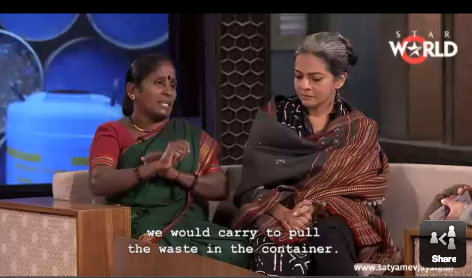
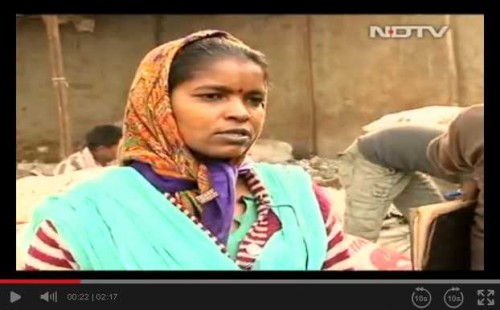

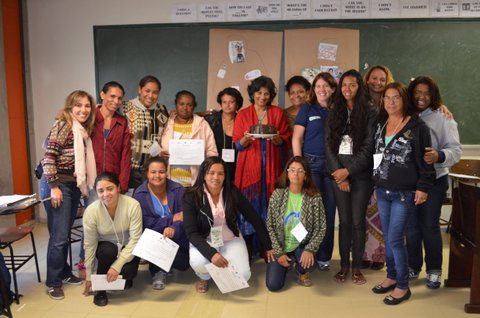

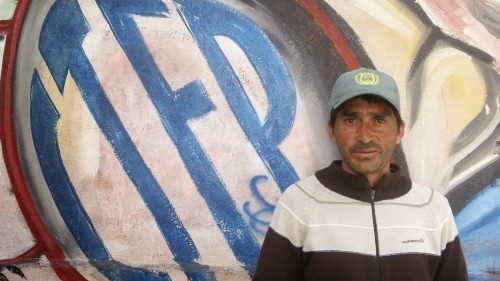
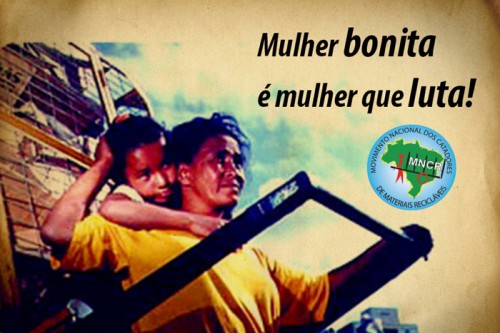
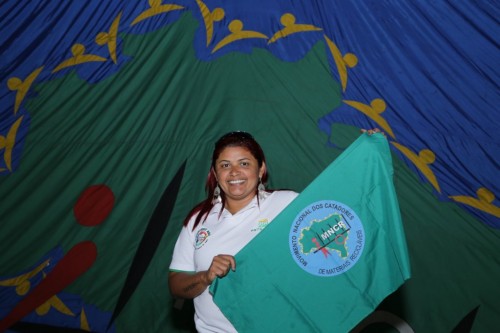

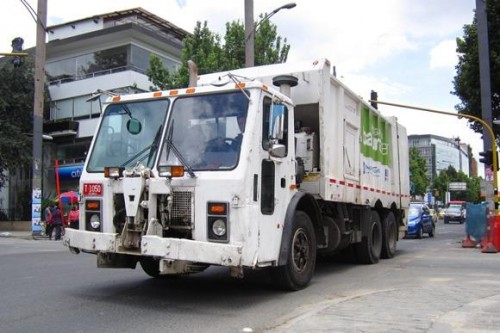
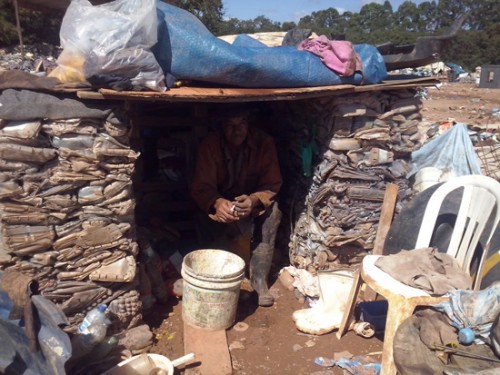


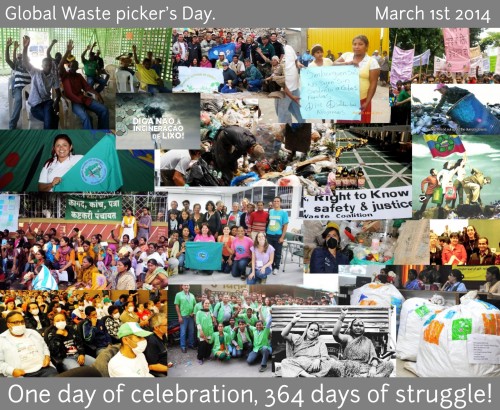
Leave a comment